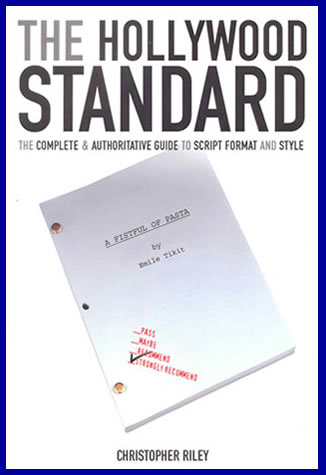

Featured Book of the Month
The Hollywood Standard: A Complete and Authoritative Guide to
Script Format and Style


Author: Christopher Riley
At under 200 pages, this book may have escaped your notice -- what with online style guides, the Screenwriter's Bible, and so many others -- but this slim volume packs way more of a punch than other books three times its size.
There are many style guides out there and they can be confusing, for they often differ on key points. And usually their writers all have a respectable pedigree, so that's no help. Sure, in Hollywood "nobody knows anything", but maybe there's someone who knows a little more than the others?
How about a guy who worked as a script proofreader at Warner Bros. for nearly 15 years?
At under 200 pages, this book may have escaped your notice -- what with online style guides, the Screenwriter's Bible, and so many others -- but this slim volume packs way more of a punch than other books three times its size.
There are many style guides out there and they can be confusing, for they often differ on key points. And usually their writers all have a respectable pedigree, so that's no help. Sure, in Hollywood "nobody knows anything", but maybe there's someone who knows a little more than the others?
How about a guy who worked as a script proofreader at Warner Bros. for nearly 15 years?

Christopher Riley, the guy in question, spent that time plowing
through more scripts than you or I will ever see in our lifetimes --
and learning formatting at the knee of industry veterans. So when he
makes the claim "complete and authoritative", for once you
can believe it!
Here you'll find the standard for every formatting issue the spec script writer will encounter. And we do mean every formatting issue: need to know the margins for quadruple dialogue? How to handle song lyrics? How to reintroduce a character in a flashback to childhood? It's all here.
The book is plainly formatted and easy to read. Riley takes just 90 pages to cover style and formatting for single-camera scripts. The remaining chapters deal with multi-camera formats, special pages, production drafts, and a nice little chapter with some good advice on the "tools of the trade".
You might find what you're looking for just by checking the 8-page table of contents, without checking the 7-page index. Chapter slugs at the top of every page help you navigate, and items are set off clearly, topped with bold, bulleted headings.
Now, before you put this book on your shelf where it belongs (you can make some room by Ebaying some of those other guides) -- read it through first. There are some unobtrusive things in here the beginner might miss.
For example: Riley goes into detail on the proper format for shots. Only later does he remind you, "when there is no strongly compelling reason to specify a particular type of shot, don't. Leave it to the director" (emphasis his). The neophyte screenwriter might be tempted to go hogwild with all those shots and angles and miss this vital bit of information.
Or: using (CONT'D) when a speech is broken by direction. Even though screenwriting software generally does this by default, and screenwriting teachers and guides still suggest (CONT'D) or (continuing), Riley reminds us this is "no longer standard practice in Hollywood and hasn't been for at least 20 years" (emphasis his). Now, this isn't a hanging offense, so no need to trash that stack of scripts filled with (CONT'D)...but take a tip for your future scripts.
How important is formatting?
Readers often make a snap decision on the quality of your script by fanning the pages to check formatting -- what Riley calls it the "fan test". Readers often assume that bad formatting = bad story (and sadly, they're often right).
Bad formatting's a strike against you before they read word one. You want to give your script every chance to succeed, and make the best impression you possibly can. Screenwriting software can help, but it can't do everything -- you need to know what to use, and when, and this book will answer those questions.
Okay -- but will good formatting make you a better storyteller? It just might! When you're no longer bogged down in the process, your freed to focus on the important things, like plot construction, characterization, and style.
The library cop on Seinfeld gave Jerry an earful for not having instant coffee: "You put it in the cupboard, you forget about it. Then later on when you need it, it's there." This book is like your instant coffee. An essential you want to have around, because you never know when you might need it.
So do yourself a favor, and pick up this one. Spend less of your valuable time casting about for the right formatting answer, and more time writing the next blockbuster!
StoryPros Verdict: Recommended
Here you'll find the standard for every formatting issue the spec script writer will encounter. And we do mean every formatting issue: need to know the margins for quadruple dialogue? How to handle song lyrics? How to reintroduce a character in a flashback to childhood? It's all here.
The book is plainly formatted and easy to read. Riley takes just 90 pages to cover style and formatting for single-camera scripts. The remaining chapters deal with multi-camera formats, special pages, production drafts, and a nice little chapter with some good advice on the "tools of the trade".
You might find what you're looking for just by checking the 8-page table of contents, without checking the 7-page index. Chapter slugs at the top of every page help you navigate, and items are set off clearly, topped with bold, bulleted headings.
Now, before you put this book on your shelf where it belongs (you can make some room by Ebaying some of those other guides) -- read it through first. There are some unobtrusive things in here the beginner might miss.
For example: Riley goes into detail on the proper format for shots. Only later does he remind you, "when there is no strongly compelling reason to specify a particular type of shot, don't. Leave it to the director" (emphasis his). The neophyte screenwriter might be tempted to go hogwild with all those shots and angles and miss this vital bit of information.
Or: using (CONT'D) when a speech is broken by direction. Even though screenwriting software generally does this by default, and screenwriting teachers and guides still suggest (CONT'D) or (continuing), Riley reminds us this is "no longer standard practice in Hollywood and hasn't been for at least 20 years" (emphasis his). Now, this isn't a hanging offense, so no need to trash that stack of scripts filled with (CONT'D)...but take a tip for your future scripts.
How important is formatting?
Readers often make a snap decision on the quality of your script by fanning the pages to check formatting -- what Riley calls it the "fan test". Readers often assume that bad formatting = bad story (and sadly, they're often right).
Bad formatting's a strike against you before they read word one. You want to give your script every chance to succeed, and make the best impression you possibly can. Screenwriting software can help, but it can't do everything -- you need to know what to use, and when, and this book will answer those questions.
Okay -- but will good formatting make you a better storyteller? It just might! When you're no longer bogged down in the process, your freed to focus on the important things, like plot construction, characterization, and style.
The library cop on Seinfeld gave Jerry an earful for not having instant coffee: "You put it in the cupboard, you forget about it. Then later on when you need it, it's there." This book is like your instant coffee. An essential you want to have around, because you never know when you might need it.
So do yourself a favor, and pick up this one. Spend less of your valuable time casting about for the right formatting answer, and more time writing the next blockbuster!
StoryPros Verdict: Recommended

Enter your email address in the box above and GO!
StoryPros E-Zine
Get the latest news, articles, events, and exclusive discounts on our
services and contests!